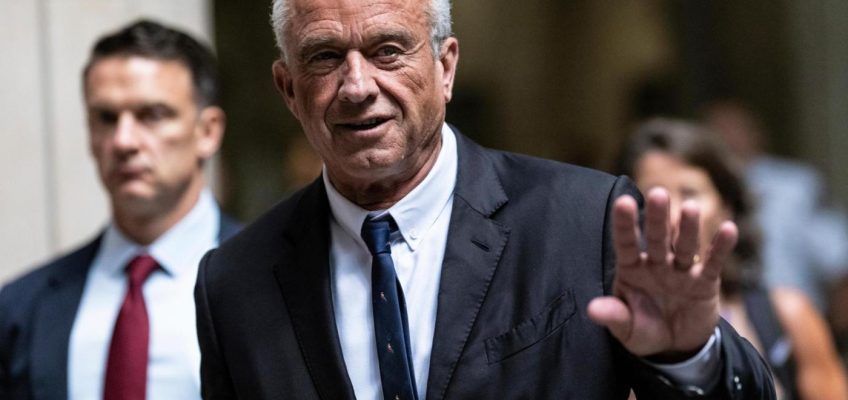By JONATHAN J. COOPER and ALI SWENSON, Associated Press
PHOENIX (AP) — Independent presidential candidate Robert F. Kennedy Jr. will speak Friday “about the present historical moment and his path forward,” his campaign announced Wednesday, fueling growing speculation that Kennedy could drop out and support Republican nominee Donald Trump.
Kennedy’s running mate openly discussed the possibility on a podcast this week, saying the campaign was considering a move to “join forces” with Trump to limit the election chance of Kamala Harris, whose Democratic convention winds up Thursday night in Chicago.
The move would have once seemed unthinkable for Kennedy, a Democrat for most of his life and — as the nephew of President John F. Kennedy and the son of Robert F. Kennedy — a member of a beloved Democratic dynasty.
Last month, during the Republican National Convention, Kennedy’s son posted and then quickly deleted a video showing a phone call between Kennedy and Trump, in which the former president appeared to try to talk Kennedy into siding with him.
Kennedy will give a speech in Phoenix, hours before Trump is scheduled to hold a rally in neighboring Glendale. A spokesperson for Kennedy, Stefanie Spear, declined to say whether he planned to drop out or why he chose Arizona for his speech.
Related Articles
Rep. Matt Gaetz wins Florida primary easily; Sen. Rick Scott to face Debbie Mucarsel-Powell
Trump holds first outdoor rally since assassination attempt as Democratic convention continues
Fact check: Harris did not vote to ‘cut Medicare,’ despite Trump’s claim
Harris-Walz ticket sharpens contrast with Trump-Vance on health care
Fact-checking Day 2 of the Democratic National Convention
After leaving the Democratic primary to run as an independent, Kennedy built an unusually strong base of support for someone running without the backing of a major party. It was unclear exactly where his support was coming from, which worried Republicans and Democrats alike.
But since President Joe Biden ended his re-election campaign and Democrats coalesced around Vice President Harris as their nominee, Kennedy’s rise has been stunted. It looks increasingly unlikely that he will be able to make the debate stage when Trump and Harris face off next month, a moment Kennedy counted on for momentum and legitimacy. His campaign finances have also been strained.
The news comes a little over a week since a New York judge ruled that Kennedy should not appear on the ballot in the state because he listed a “sham” address on nominating petitions. Kennedy has appealed, but has faced several similar challenges around the country.
On Wednesday, he was in a courtroom in a suburb of New York City, testifying in a trial for another ballot suit in the state, this one backed by the Democratic National Committee, that challenges the signatures collected by his campaign.
During a break in the court proceedings, Kennedy declined to answer questions from reporters about whether he was dropping out.
He’s also facing a likely legal challenge in Arizona, where last week he submitted signatures that may have been collected by a super PAC that supports him, which Kennedy’s critics say is illegal coordination between a candidate and an independent political group.
___
Swenson reported from New York. Associated Press writer Cedar Attanasio contributed from Mineola, New York.
___
The Associated Press receives support from several private foundations to enhance its explanatory coverage of elections and democracy. See more about AP’s democracy initiative here. The AP is solely responsible for all content.


Leave a Reply